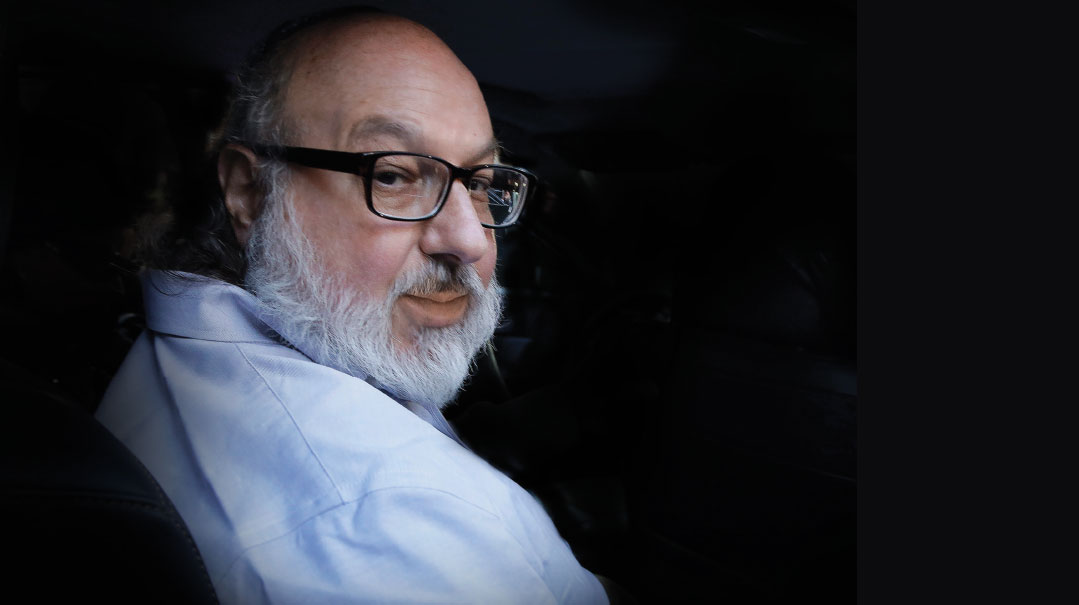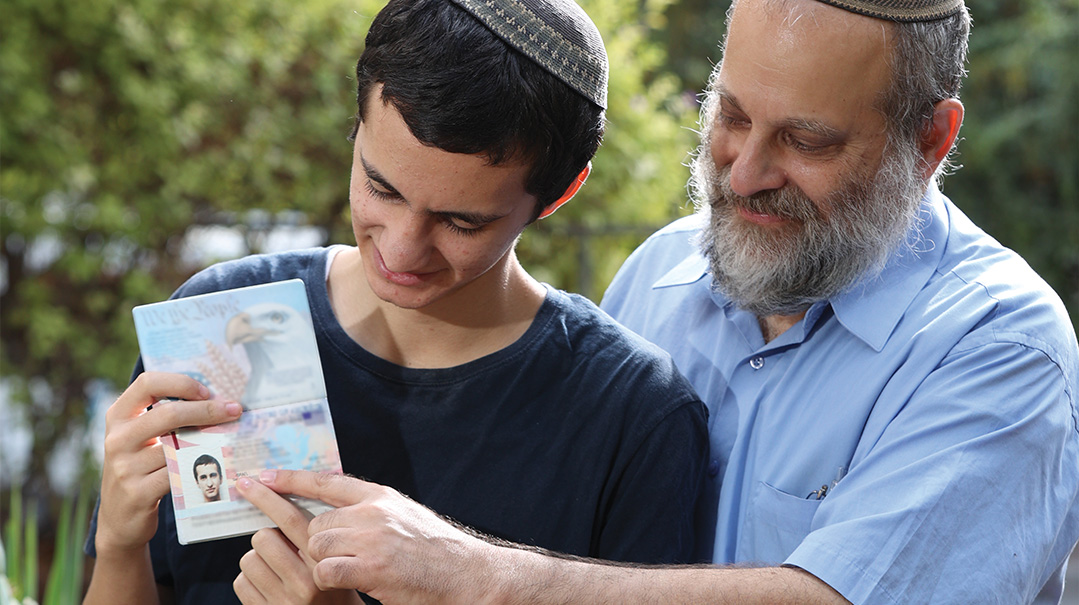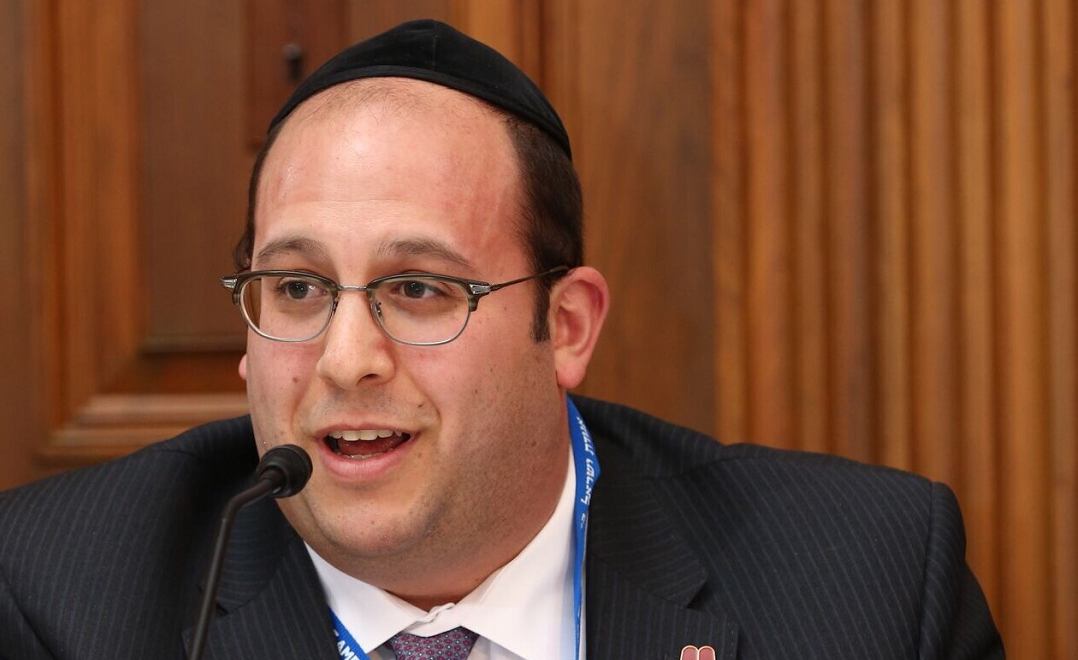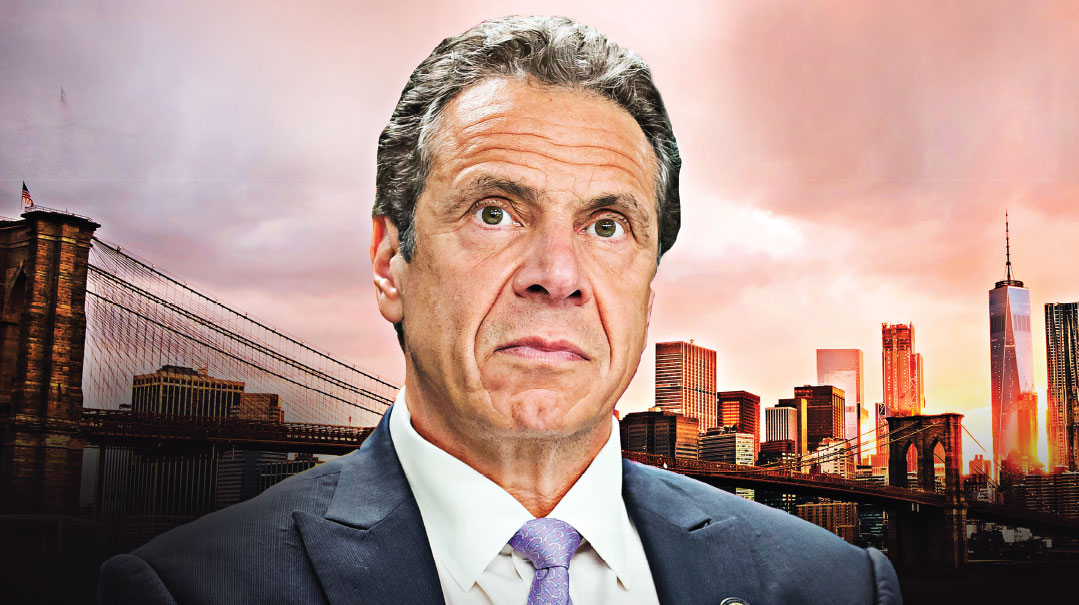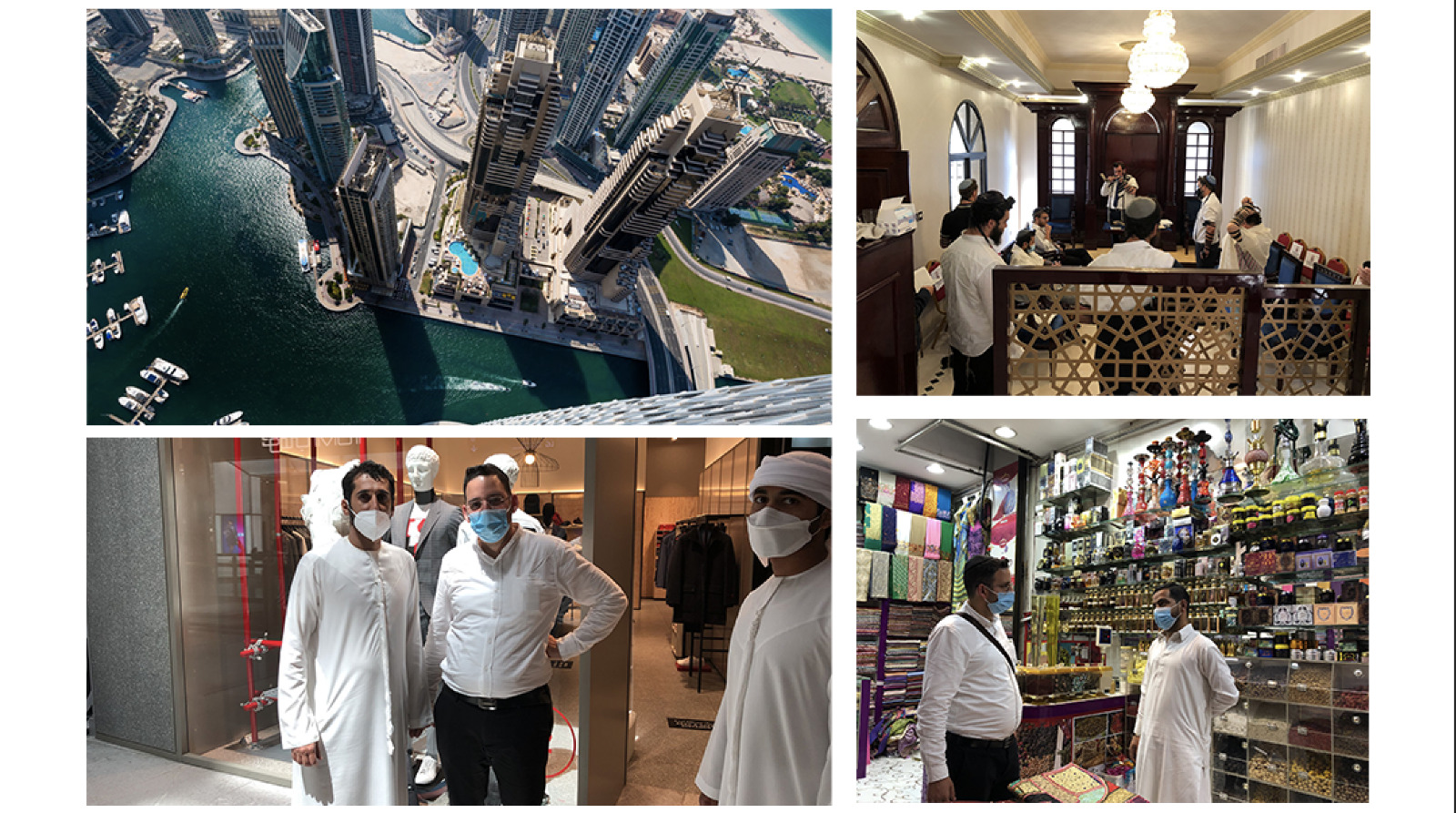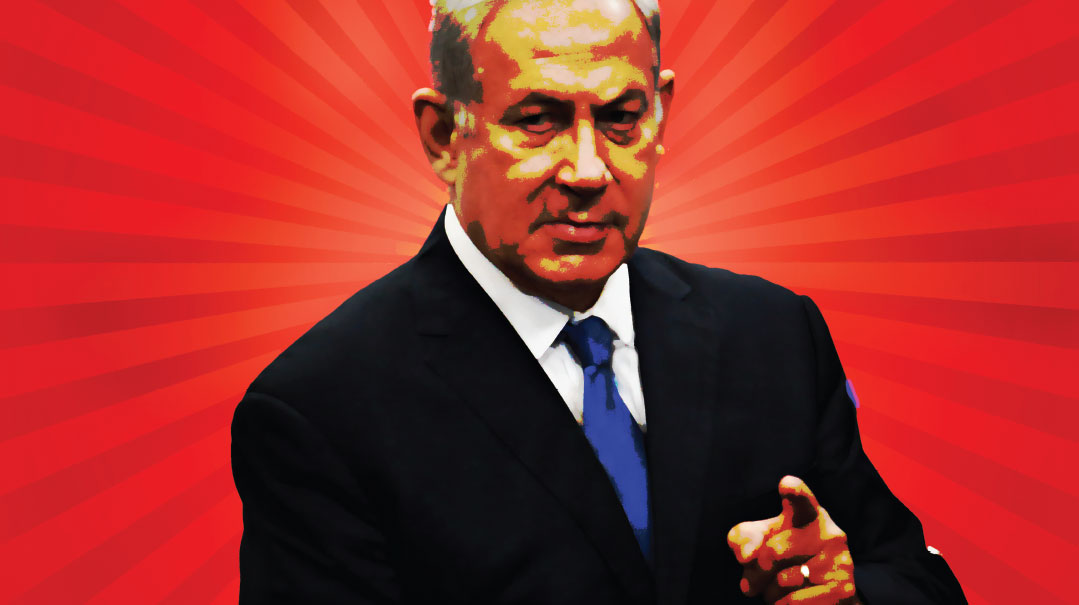America the Broken?

As a massive wave of protests overtakes the United States, can the nation repair its badly frayed fabric?
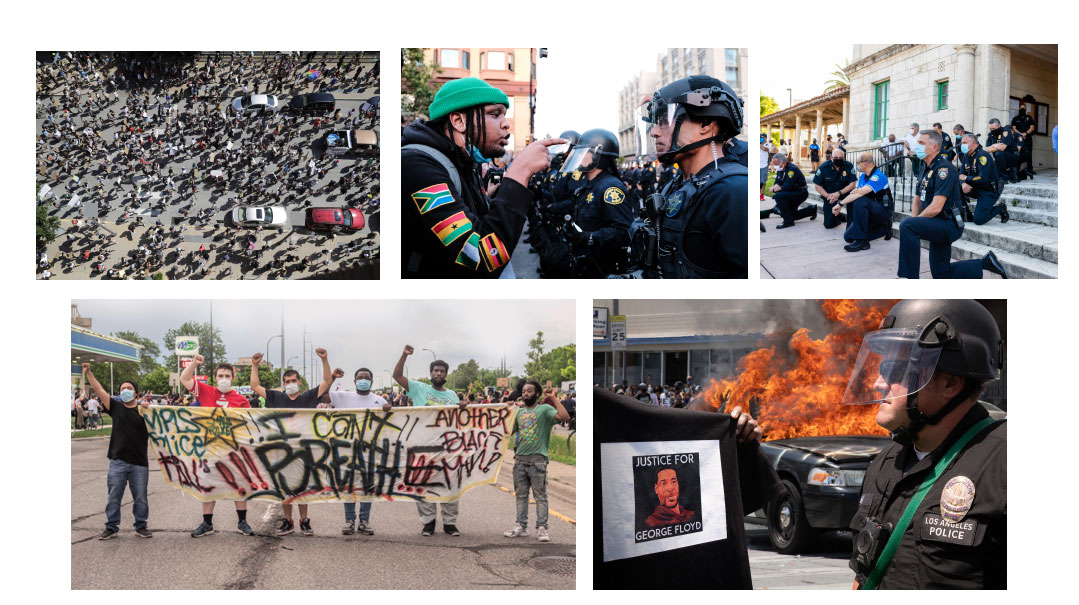

Photos: AP images
W
hat began as an example of horrific police abuse of a helpless man is ending with calls for sweeping societal reforms. America is asking itself many questions in these fraught times, among them: Do police officers disproportionately harass and discriminate against black Americans? Should be police departments be defunded altogether, or completely restructured? What place, if any, does violent rioting have in our body politic? How do these events compare to some of the infamous riots in America’s history?
For the Orthodox Jewish community in America, the unrest has also left us to consider our place in the wider social fabric. The Torah demands justice and compassion for the downtrodden, and we, as Jews who reflect those values are outraged and sickened by the societal prejudice manifest in the murder of George Floyd. However, as among the smallest of minorities, American Jews depend on the protection of the police against anti-Semites. As we have seen just in the last year and a half in Jersey City, New Jersey, and Monsey, New York, that protection is often the difference between life and death.
To dig deeper into these complex issues, we invited a panel of experts to answer a series of questions. They are:
Richard Altabe is the principal of the Lower School at the Hebrew Academy of Long Beach and is currently the chairman of the board at the Jewish Community Council of the Rockaway Peninsula. He has been active in local community politics for many years, serving as an elected school board member in Queens and on the local community board.
Cheryl Greenberg is a professor of history at Trinity College who teaches courses in African American history and the history of race in the US. Her research interests include black-Jewish relations and the civil rights movement.
Maria Haberfeld is a professor of police science in the Department of Law, Police Science, and Criminal Justice Administration at John Jay College of Criminal Justice in New York City. Born in Poland, she immigrated to Israel as a teenager, serving in the Israel Defense Forces in a counter-terrorism unit, and later as a member of the Israel National Police. She is an expert in police training and has worked extensively with the New York City Police Department.
Jeff Jacoby is a prize-winning columnist for the Boston Globe.
David Luchins is chair of the political science department at Touro College and the founding dean at the Lander College for Women. He has long been active in Jewish communal life. He was the senior advisor for Senator Daniel Patrick Moynihan, on whose staff he served for 20 years.
1. Something seems to be broken in the United States. A significant portion of the population does not trust law enforcement, and many are suspicious of politicians. Between the coronavirus, the high unemployment rates, and the mass protests following yet another police killing, there’s a feeling that the country is pulling apart. What do you think led to this state of affairs, and what can be done to address it?
Prof. Haberfeld: I have been studying, researching, and publishing on the topic of policing in the United States and around the world for over 25 years. From the moment I started looking at the American policing system, it was clear to me that it was profoundly broken. Actually the first words I ever uttered, when I first arrived in this country over 35 years ago to serve in the Office of the Israel Police Representative in the United States, and found out that there are over 18,000 police forces in the country, were: “It is a paradise for criminals.” Later on, I added to my perception that it is also a source of unprofessional service and a dangerous approach to this most noble of professions.
I am convinced that policing — effective, fair, and professional policing — is the pillar of any democracy. Likewise, and the opposite of these qualities, an ineffective, unfair, and unprofessional police force will be the source of its demise. Police is a visible arm of a local, state, or federal government. Not only is it its visible arm, it is also its most tangible arm. It is hard to put your hands, figuratively and physically, on a given politician. And the higher up they are, the harder it becomes. But it’s so easy to reach out for a brick or a bottle of urine and toss it, together with your individual frustration, at the visible and tangible representative of the politicians.
Yes, the state of affairs in the United States is grim today, but nowadays, it is not irreversible. If we centralize and professionalize the police force, and remove it from under the arm of the politicians, things will start to change. Not overnight but they will start to change.
Prof. Greenberg: We have watched as all the mechanisms collapse that had served to maintain trust in our democratic government. We have a president who leads by insulting and threatening those who disagree with him and by dividing the country at a time that we need to pull together. Tax cuts benefited the rich, which further divided the rich from the rest of us.
What can be done? A systematic reexamination of the ways in which the country went awry, a return of a politics of dignity and national unity, of compassion and a commitment to justice. The creation of a true safety net that includes a decent education, access to adequate food, shelter, and health care, and strictly enforced laws against discrimination. And a return to the belief (which should be cultivated and modeled by our leaders) in a spacious, welcoming, open society that the US, in its best moments, has tried to embody.
We have certainly failed in the past. But today it is not clear many Americans even believe those are worthy goals. If we no longer hold those beliefs, that will be the end of the grand American experiment.
Richard Altabe: Events do not occur randomly. We are being challenged by HaKadosh Baruch Hu to rethink our place in the world and in this country. The status quo has changed, and we need to change as well. Should we return to the days of 1,000 attendees at a wedding? Should we consider moving to Israel? Clearly, we have ignored certain inequities in this country for too long, and we had the false belief that we were in control of our lives. We should respond to all of this by increasing our emunah and avodas Hashem.
2. Is it true that white officers disproportionately discriminate against black Americans? Or is that largely a matter of perception? What reforms need to be enacted to change things?
Prof. Haberfeld: The answer to this question is semi-scientific and semi-perceptional. Over the last 20-plus years there have been a number of studies around the country with mixed results. Some pointed to police officers from various departments stopping African Americans at a higher rate than other populations, and some didn’t arrive at the same conclusion. The high-profile cases, featured on the news media, primarily show police officers mistreating members of minority communities. Yet coverage is very rarely given to the same treatment of a white American… [creating] an issue of perception.
We need to create national standards for recruitment and selection and training. Then we can allow states to centralize their police forces and create one police force per state, instead of hundreds. For example, New York state has over 600 autonomous police departments: This needs to end in order to create more professional standards. The training should be entrusted to professionals, regardless of their political affiliations. And police chiefs and commissioners should be appointed by commissions that are composed of bipartisan participants, not the mayors of local jurisdictions. These chiefs and commissioners should be given the freedom to conduct and deploy based on their understanding of the situation and cease to be the puppets of the politicians who appoint them.
Prof. Greenberg: It is absolutely true. It is true in every state and city, federally and locally. More unarmed black men have been killed by police than armed white men. Black people, both adults and children, are more often arrested than white people for the same crimes and given longer sentences. To take just two examples, black and white people use drugs in the same proportion, but a vastly disproportionate number of black people are arrested and sentenced for violating drug laws. The armed white people we saw a few weeks ago demanding the lifting of quarantine requirements and calling for violence against governors and mayors who disagreed were met by police who kept order without any violence. The non-violent protesters objecting to the killing of an unarmed and cuffed black man were met with tear gas, rubber bullets, beatings, mass arrests, and detention.
Richard Altabe: The question is inappropriate. Whether this is fact or perception is immaterial. What is important to understand is that our African American neighbors feel aggrieved and persecuted. Before considering reforms that are not in our control, we need to look inside ourselves at our own actions and speech. Do we regularly make statements that debase people of color? Do our children mimic our attitudes in their own behavior? Do we make sure to accord respect to all people regardless of race, socioeconomic status, etc.? Or are we like the stork, the chasidah, which is considered non-kosher since it only displays chesed to its own? We need to reassess our own behavior and attitudes, no matter which reforms end up becoming law.
3. President Trump initially expressed sympathy for the death of George Floyd, but his rhetoric since then has been tough and uncompromising. What is your opinion of how he is handling the situation and reading the national mood?
Richard Altabe: Even if the president was able to speak to the nation in a way that brought healing, the media and others would seek to tear him down. Unfortunately, we have a president who does not excel at using the bully pulpit to heal the nation, and we have a media that seeks to disrespect any statement the president might make. I do think that our president is pained by the George Floyd murder and is also pained by the rioting he sees destroying our cities.
Prof. Haberfeld: I am not a politician. I am a social scientist who studies police as an organization and the behavior of police officers within that organization. Yet I do know that the current events are not a product of the Trump presidency. This country has a history of racism — over 1,000 hate groups have been identified over the years by the Southern Poverty Law Center. He certainly is not the kind of politician who projects brotherly love — but how much changed under President Obama, whom some people view as the quintessential president for this country?
Politicians have the tendency to surround themselves with people who sing their tunes and are afraid of bringing on board people who represent best practices and knowledge in the field, regardless of their political affiliations. The current president does not differ in that sense from his predecessors.
Prof. Greenberg: Trump is playing to the people he believes are his base, by demanding “law and order” and threatening harsh reprisals against anyone who protests. He has labeled protesters as criminals, terrorist thugs, and has threatened military action against American citizens. He is counting on his base to agree with his views. I don’t know that they do. This is not “uncompromising,” it is a threat of fascism.
Peaceful demonstrators in Washington, D.C., were met by violence, with the military, the National Guard, the Bureau of Prisons’ riot police, and law enforcement officials who refused to wear insignia. This has pushed even some GOP and military leaders to speak out against the president. Polls suggest the majority of Americans do not support this violation of civil liberties and threat to democratic governance, and that they take seriously the claim that structural forces have maintained racism and inequality in the US, and that this deserves further examination.
4. Even as police offers were attacked and in at least one case, killed by protesters, we saw the incredible sight last week of groups of police officers kneeling down in solidarity with the demonstrators. There were also those who advocated “defunding” police departments, apparently in an attempt to stem police abuses. Is having smaller police departments with less powerful weapons the answer? If not, what would help?
Prof. Greenberg: The call to defund the police does not mean anarchy. It means three things: cut police spending on and access to military equipment and other means of overwhelming force and intimidation (no tanks in our cities); investing less in prisons and police overall and more in the services needed to stop crime in the first place, like education; and, finally, it means rethinking our system of policing completely.
Our police system is based on slave patrols in the antebellum South that had the right to maim or kill, to storm private spaces, to threaten and intimidate, in order to find enslaved people who ran away, and also on newly formed police forces in the North, similarly empowered to use violence and intimidation to control immigrants and the poor. Both systems prioritized the interests of wealthy, white men and their property, rather than creating structures to rehabilitate criminals or erect supports that would lessen crime.
Prisons in the US have a higher number of drug-addicted people and mentally ill people than any other institution. Why aren’t we spending more on mental health and drug rehab programs to keep people out of prison, rather than building more prisons to house them? Why is there such a large number of functionally illiterate adults in prison? Wouldn’t it be better to build a better education system for all children? Defunding the police means looking at all of this and asking whether there is a better way to move forward than the system currently in place.
Prof. Haberfeld: We do need the police. Defunding the police would be disastrous. Crime is not a figment of our imaginations, it has been with us from time immemorial. Defunding the police will cut, first and foremost, into the training funds, and this will be the end of professional policing. Centralization of the force is the answer.
The overwhelming number of police officers in today’s law enforcement are good, dedicated, brave, and fine individuals. However, they do not receive the right tools to [do their jobs] in an effective manner and are plagued by the ghosts of the past and political correctness. I have advocated for years now that we need to start creating different standards for recruitment and selection. For instance, we need to start recruiting at an older age. We know by now that people mature — emotionally and psychologically — only into their late twenties. It is incomprehensible to me that we continue to recruit people in their teens and early twenties years and give them the discretion over people’s lives.
We need to screen potential recruits not only based on their age but also, and primarily, based on their emotional and social intelligence. We need to prohibit recruiting people who have criminal records and/or were fired by other departments for disciplinary violations. This is where we should start.
As for the ones who are already on the job, we need to create a different type of in-service training, something I have written about in my book entitled Critical Issues in Police Training. We need to move from what I refer to as “reactive training” to “proactive training,” which means training based on the needs of the profession and best practices.
Richard Altabe: Defunding the police is a terrible idea. Reforms like making choke holds illegal are good ideas. There needs to be a better way to vet potential police officers and to root out those who might be abusive.
5. Comparisons have been made between these riots and those in 1968 and 1992. How do you think these riots are similar and different?
Prof. Haberfeld: I do not think that one can compare riots during different times in history. We are talking about different generations. [However,] both were mobilized by calls for justice for the minority communities, and both demanded justice for all. The truth is that most protests throughout modern history are based on calls for justice, and primarily against the suppression of the poor and disenfranchised. Both also erupted after a high-profile event, and, as in other demonstrations around the country and world, the anger was directed toward the police.
While it is undeniable that some police officers behave in a most violent and unacceptable manner, the politics of racial, social, or economic injustice has nothing to do with policing. Rather, it has to do first and foremost with politicians. Yet the demonstrators who further the rhetoric of human and civil rights direct their anger at the police instead of at the politicians.
Prof. Greenberg: All of these grew out of the frustration of people who had tried other means to bring justice for black communities, but who had been blocked at every turn. Finally, unwilling to wait patiently any longer, their protests turned destructive and violent.
Two things are different in the present moment, however. One, of course, is the widespread use of social media, which allows information (and disinformation) to spread quickly, and to allow instant planning and coordination by both protesters and white supremacist groups. The people organizing today are better informed and more strategic about their actions because they have built new structures and learned from the past.
The other difference is that these current protests are more integrated and take place in more integrated settings. It is not only black people in the streets this time; the protests are more diverse. Similarly, the protests are not in black neighborhoods but downtown, highlighting the very different economic moment we are in, where chain and box stores dominate and where both white and black people shop.
It is possible that there is one more difference (only time will tell if it is real), and that is the immediate and explicit support expressed by corporations, universities, political leaders, professional organizations, and other politically oriented activist groups, all pledging to take a deeper look at systemic and institutional racism. Is this lip service or a serious commitment? To the extent it is the latter, it suggests this moment might indeed bring about meaningful change.
Richard Altabe: Today’s riots are being fomented by outside groups whose objective is to destroy the United States of America. The protesting might be similar in nature to the civil rights protests of the ’60s but the riots are not.
I attended the recent protest in Far Rockaway [Queens] and stood with local black leadership in support of the community’s outrage at the George Floyd murder. The protesters were peaceful. However, we did see in attendance many outsiders (including white people) who were there to cause violence. Thankfully, in our case the protesters maintained control and actually called out the outsiders and forced them to remain quiet.
We need to be cognizant of these outside groups, and we need to investigate where they are getting their funding.
Jeff Jacoby: There has been much commentary comparing this year’s turmoil to that in 1968. Some argue that things have gotten worse; others, that things are better. I can see merit on both sides. But on a personal level, the biggest difference for me is that I am experiencing 2020 as a parent, and my fears and worry for the country I love are entwined with fear and worry for the children I love.
In the 1960s, when I was growing up in Cleveland, it was my father whose business suffered the effects of lawlessness and disorder. In 1968, riots, arson, and looting devastated Cleveland’s Glenville neighborhood, where Mark’s Furniture & Appliance Co. — my father’s store — was located.
For years my dad had a furniture store on the corner of St. Clair Avenue and 103rd Street , in the heart of the city’s Glenville district. On multiple occasions the store was broken into. In the middle of the night, my father would get a call from the alarm company telling him what had happened; he would have to get dressed and drive into the city to repair the damage as best he could. My siblings and I were too young to know that heading into Glenville in the middle of the night could be dangerous, but I can well imagine — reflecting on it as an adult — how anxious my mother must have been.
When deadly riots erupted in Cleveland in 1968, they were concentrated in Glenville. For days, the area was wracked by theft, vandalism, and arson. By the time it was safe enough for my father to venture back into the city, he expected to find his store a smoking ruin.
Incredibly, he found it untouched. The pawn shop next door had been gutted, but Mark’s Furniture & Appliance Co. had been left alone. My parents learned later that a group of tenants who lived in the apartments above the store had come down to the street and formed a human chain to deter looters.
“Stay away from this place,” they told them. “It belongs to a good man.”
That was an act of beautiful grace in the midst of ugly devastation and anarchy.
At a time of overflowing anger and bitterness, America desperately needs more acts of beauty and grace. It is so much easier to see the darkness now than to recognize the goodness of our neighbors. The cop who killed George Floyd and the rioters torching our cities show us the worst of America. It is up to the rest of us to show the best.
This excerpt originally appeared in the Boston Globe and is reprinted with permission.
6. The world was horrified by the George Floyd video, and rightly so. Most Americans likely supported the initial peaceful protests, but now we are seeing significant looting and destruction of property. Many residents of cities see the looters as lawless opportunists who threaten their safety and in whose worldview theft, vandalism, and violence are a valid response to systemic injustice. Is there any chance of productive dialogue with the hundreds of thousands of peaceful protestors and the even larger communities they represent, or will the violence of a small minority undermine the possibility for a constructive conversation to begin?
Richard Altabe: In communities like ours where there has been a long history of productive dialogue with our African American neighbors, we continue to see the value of dialogue. If you understand that the looters are being encouraged by outside groups with an anti-American agenda, you will understand that there is no possibility of dialogue with those who loot. If, however, we strengthen the dialogue with those we know, we can cooperatively stop the influence of the outsiders who are fomenting riots across this country.
Prof. Greenberg: This question conflates protesters and looters. Not only is that a false linkage, it is a dangerous one. The people and groups calling for and organizing the protests are uniformly committed to nonviolent protest. Most of the protests have in fact been completely nonviolent (by protesters, at least). In some cases, some protesters, so angry they feel they must express their feelings, have broken glass or attacked physical structures that embody the oppression they feel. And a completely different group, opportunists, has in some protests seized the opportunity to loot. This last group has been present at every moment of mass protest in history, but they are not the political activists or even angry and frustrated protesters. Whether there is productive dialogue to be had with this last group is a fair question. But these are not the people whom we should be talking with. Those who are actually protesting are the ones who need to be in conversation with political and economic leaders.
Prof. Haberfeld: Looting, vandalism, and violent behavior is never the answer. What we are seeing is, predominantly, a criminal element that was involved in criminal activity prior to the civil dissent movement and is using this opportunity to continue its criminal behavior.
Two famous criminologists, Sykes and Matza, came up with a very telling explanation of criminal behavior referred to as “the techniques of neutralization,” which are used by people who violate the laws in order to justify their behavior. There are five techniques of neutralization: denial of responsibility, denial of injury, denial of victim, condemnation of the condemners, and the appeal to higher loyalties. In my opinion, the majority of these looters and vandals are using one of these techniques to justify their criminal activities. By doing so they contaminate, in the most profound manner, the cause of civil dissent.
Killing people at random, like the criminals who killed a security guard in Minnesota protecting a store from looters, make it so much harder to engage in any type of a productive dialogue. What we need is a total separation of the civil dissent movement from the criminal element. Until that happens, I don’t see anybody entertaining, in any serious manner, a conversation with people who destroy the businesses of the very same people they claim they are fighting for.
7. Taking a long-term view, where should the Orthodox Jewish community be positioned? On the one hand, Jews have always had a strong sense of justice and have always protested injustice. On the other hand, we’ve found that when the conversation revolves around oppressed versus oppressors, the liberals have rarely loved the Jews back.
Richard Altabe: This question is way too limiting. Jews need to live in peace with their neighbors and to respect all humanity. We are too hyper-focused on our differences rather than on what we have in common.
The Orthodox communities in this country still do not adequately participate in the electoral process, and hence our voice is limited. Rather than hand-wringing or complaining over social media, we need to become more active politically and vote in ways that will ensure that our voice will be heard.
Here in Far Rockaway, we all suffered from a high rate of coronavirus, and we all had our homes destroyed by Hurricane Sandy. We do best when we find our common interests and work together. We are the Am Hanivchar, and we need to fight to make a kiddush Hashem in this world. If we stand up for what is right in the eyes of Hashem, we will be respected.
David Luchins: “For every complex question,” an oft quoted aphorism declares, “there is almost always a truly simple answer, and it is almost always wrong.”
This nugget came to mind as I read the litany of complex questions the editor of Mishpacha would like me to address in “300-400 words.” You’ve got to be kidding. Then I got to the final question, and I believe I have a simple answer to your many complex questions, one that has withstood the test of history.
Question: Taking a long-term view, where should the Orthodox Jewish community be positioned?
Answer: Where our gedolei Torah advise us to be.
And their advice has almost always been to avoid taking partisan sides on political issues.
In 1995, the leadership of the Agudath Israel and the Orthodox Union requested the guidance of a Torah giant on a highly polarized political issue in which all parties were demanding our public support. I had the privilege to discuss this question with Rav Mordechai Gifter ztz”l, the unforgettable Telshe Rosh Yeshivah, who advised us to follow the example of the Sanhedrin who avoided Achashveirosh’s demand that they determine the fate of the rebellious Queen Vashti. The Gemara in Megillah explains that the rabbis realized that whatever they said might well lead to communal catastrophe. They wisely replied they “have lost the ability to answer such questions after the destruction of the Temple.”
“Listen to their advice,” Rav Gifter instructed us. “Avoid public posturing that feels good now, but may endanger our community in the future.”
This timeless advice has served our community well. It is no accident that Orthodox lay and professional leaders have been the only Jewish leaders who have been welcome in the inner sanctum of the Bush, Obama, and Trump administrations. These leaders have skillfully earned the trust and respect of Democrats and Republicans, conservatives and liberals, white, black, and Latino elected officials — precisely because they know that, while we have deeply felt core principles, we don’t take partisan sides in their disputes. To give one example, hundreds of millions of dollars has been unanimously allocated by Congress, under three presidents of very different political persuasions, to help protect our schools and synagogues.
Of course, it is increasingly difficult to maintain this bipartisan balance in a ferociously polarized world, where the extremists on both sides get most of the attention, but if I may, here are three observations of how it can be done.
- The extreme right and left drink deeply from the same anti-Semitic bilge. The far left embraces intersectionality, which proposes that you are a racist, misogynist, or homophobe unless you believe that “from the river to the sea, Palestine must be free.” The Chinese have put millions of Muslims in concentration camps; it doesn’t matter because Palestinians and only Palestinians are able to claim protective status. On the other hand, the extreme right embraces the teachings of Madison Grant and the bizarre “replacement theory” that teaches Jews are trying to undermine Western civilization by bringing inferior races into North America and Western Europe. “Jew will not replace us,” they chanted in Charlottesville. And both the Pittsburgh and Poway gunmen cited replacement theory in their manifestos.
- Every poll and study show that despite surging anti-Semitism on the extremes, Jews remain the most respected minority group in the country. Both political parties paint the other party as anti-Semitic when the vast majority of Democrats and Republicans remain our friends.
- The media loves to play up the crazy on both sides. Horace Greeley, the famous newspaper editor, was once asked how he decides what goes on the front page. He answered: “When a dog bites a man it is not news, but when a man bites a dog it is front page news.”
When the House of Representatives voted 398 to 17 this past summer to condemn BDS as anti-Semitic, it received virtually no media. Fifty-five of the fifty-six African Americans in the US House of Representatives vote with Israel but received almost no attention.
Steny Hoyer, the House majority leader, addressed AIPAC a few months earlier and said, “There are 62 freshman Democrats in the House: 59 opposed BDS, 59 support Israel. How come you only know the names of the other three?”
A valid and powerful question. We must not allow the oversized attention given to the rhetoric of a few to shake our belief in the wisdom of the path that has served us so well for so long.
WE ARE ALL UP TO THE CHALLENGE
by Gary Torgow
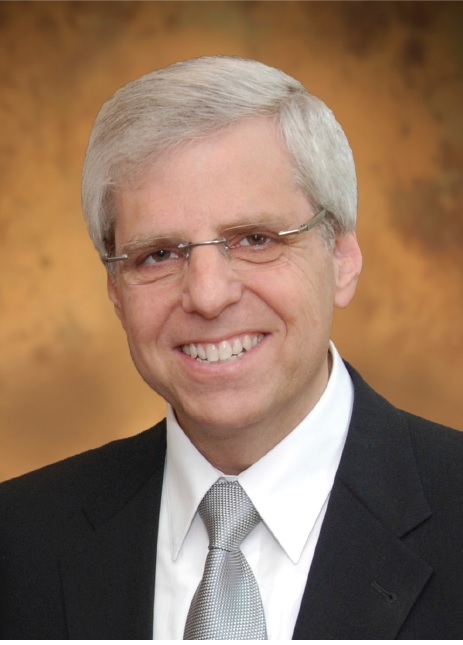
T
he global COVID-19 pandemic and the tragic events surrounding the horrific death of George Floyd requires of us all an examination of many of our personal and communal attitudes and behavior.
As part of this introspection and during these incredible times, we must be ever mindful of the Torah’s demand that we be a “Light unto the Nations.” This Torah edict at times requires, when appropriate and sanctioned by daas Torah, vigilant and outspoken leadership, even when it causes some discomfort.
The barbaric, tragic and inhumane annihilation of millions of our people during the Holocaust of World War II suggests to all of us a need to denounce and focus a sympathetic eye toward the horrific events that occurred last week in Minneapolis and to a community that continues to suffer widespread and significant disparate treatment.
Our great country of America was built on the precepts of a bill of rights, which we all collectively rely on to never permit any of us to be left unprotected. Social Justice is a fabric of our country and when any part of the population loses those rightful benefits and privileges, every one of us must protest.
The actions of police officers Derek Chauvin and his accomplices were criminal, illegal, and despicable. The video that captured their behavior was sickening and disturbing.
Mr. Floyd was the latest tragedy in a centuries-long line of African Americans to suffer violent deaths at the hands of police officers. They were victims of a law enforcement system that produces legions of incredibly dedicated public servants while still shielding some who prey without apology on the black and minority communities and individuals.
While being guided by our holy Torah, which abhors individual or societal discrimination, our community must be particularly vigilant in protesting these behaviors — because we know as well as any, how debilitating the loss of these rights can be for every citizen and every community.
We also must unite to condemn and seek punishment for agitators who claim rights as protesters, but are in fact interlopers seeking destruction and mayhem. Peaceful protesting is an appropriate and noble activity; violent and criminal protest is disreputable and contemptible.
Most police officers in this country are exceptional public servants and we all owe them a tremendous debt of gratitude. There is no such thing as a society without proper authority, and calling for a disbandment of the police system in our cities would be an action we would all deeply regret.
At the same time we must demand the sanctioning, prosecuting, and punishing of those in law enforcement who bring dishonor to the ranks of good, fair and dedicated policing. And we also must endeavor to find better and more appropriate ways to reward those who live up to the highest ideals of the police profession.
Racism and bias are anathema to our kehillah and therefore we must unite with all law-abiding citizens to eradicate and eliminate every form of bigotry. This includes and requires our country’s leadership to recognize that any form of anti-Semitism — both latent and patent — is despicable and repulsive, and must be condemned in the strongest of terms as well.
For all its faults, America is a collection of truly great people ever striving to be better and to fashion a more perfect union. Together we can endeavor as a Jewish community to join in the effort to make every citizen truly equal under the law, because each of us were created equal by our Father in Heaven. We can be an agent of change; let us endeavor to do so under the banner spoken by the Prophet Micha, “Do Justice, love Kindness and walk Humbly with your G-d.”
Gary Torgow is the executive chairman of TCF Financial and Chemical Financial Corporation. He is a veteran community activist and board member of several foundations in Detroit, Michigan, where he lives with his family.
(Originally featured in Mishpacha, Issue 814)
Oops! We could not locate your form.






